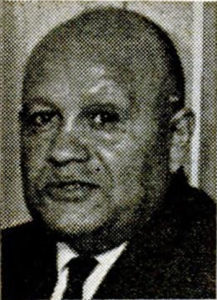
Halley Harding
*Halley Harding was born on this date in 1904. He was a Black college and semi-pro athlete, actor, journalist, and civil rights activist. William Claire (Halley) Harding was born in Wichita, Kansas. Early in his childhood, his family moved to Kansas City, Missouri, and Chicago, Illinois.
In the early 1920s, he attended Knox College of Galesburg, Illinois, and by the fall of 1924, he had transferred to Wilberforce University in Ohio. From 1924 through 1931, he played football at Fisk University, and at Wiley College, he was a debate team member.
Halley played Negro League baseball with the Kansas City Monarchs between the 1931 season, then in the 1932 seasons. Moving around, he was a Harlem Ren’s basketball team member, a forerunner to the Harlem Globetrotters. He also played semi-pro football on two all-black teams when the NFL was segregated. In California, he also played bit roles in two Black movies ‘Life Goes On’ and ‘The Duke is Tops’ (1939) and ‘Mystery in Swing’ (1940).
In 1946, he was working as a sports editor. The segregated NFL wanted to expand the league by moving the Cleveland Ram to Los Angeles. The team sought to play in the publicly owned Los Angeles Memorial Coliseum. This pressured the team to integrate racially since black and white taxpayers had paid for the facility's construction. Boycotting this, Harding was especially outspoken at a public meeting of the Coliseum Commission on January 15, 1946. After his presentation, Rams (then) general manager Charles “Chili” Walsh agreed to take questions from the public. Halley Harding seized the floor and delivered an impassioned, impromptu speech about the history of Black players such as Fritz Pollard and Sol Butler.
Kenny Washington signed with the Los Angeles Rams on March 21, 1946. The NFL march to integration only strengthened Harding’s case against the Negro leagues, which was deepened by bitter memories of his career as a player. On March 30, 1950, Harding, by then a columnist for the Los Angeles Sentinel, criticized an unnamed Negro league team for supposedly playing a regulation game on the way to training camp. By the 1960s, Halley Harding had returned to Chicago to write for a “militant” weekly, The New Crusader. Halley Harding died on April 1, 1967.